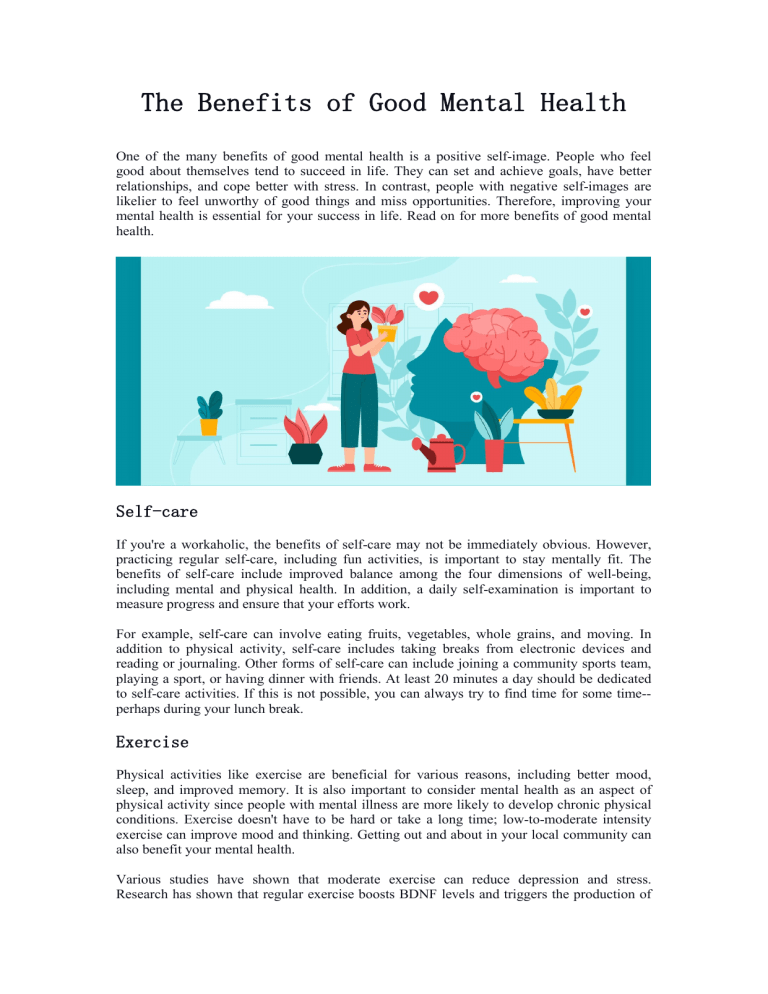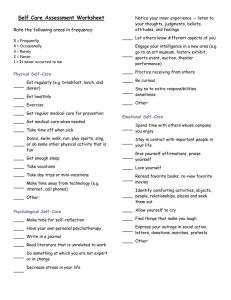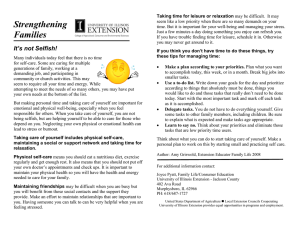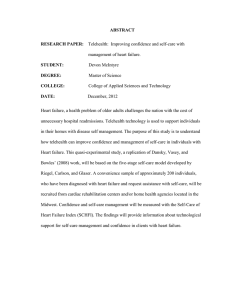Benefits of Good Mental Health: Self-Care, Exercise, Therapy
advertisement

The Benefits of Good Mental Health One of the many benefits of good mental health is a positive self-image. People who feel good about themselves tend to succeed in life. They can set and achieve goals, have better relationships, and cope better with stress. In contrast, people with negative self-images are likelier to feel unworthy of good things and miss opportunities. Therefore, improving your mental health is essential for your success in life. Read on for more benefits of good mental health. Self-care If you're a workaholic, the benefits of self-care may not be immediately obvious. However, practicing regular self-care, including fun activities, is important to stay mentally fit. The benefits of self-care include improved balance among the four dimensions of well-being, including mental and physical health. In addition, a daily self-examination is important to measure progress and ensure that your efforts work. For example, self-care can involve eating fruits, vegetables, whole grains, and moving. In addition to physical activity, self-care includes taking breaks from electronic devices and reading or journaling. Other forms of self-care can include joining a community sports team, playing a sport, or having dinner with friends. At least 20 minutes a day should be dedicated to self-care activities. If this is not possible, you can always try to find time for some time-perhaps during your lunch break. Exercise Physical activities like exercise are beneficial for various reasons, including better mood, sleep, and improved memory. It is also important to consider mental health as an aspect of physical activity since people with mental illness are more likely to develop chronic physical conditions. Exercise doesn't have to be hard or take a long time; low-to-moderate intensity exercise can improve mood and thinking. Getting out and about in your local community can also benefit your mental health. Various studies have shown that moderate exercise can reduce depression and stress. Research has shown that regular exercise boosts BDNF levels and triggers the production of endocannabinoids, which modify connections between brain cells and may improve learning in mental illnesses. Furthermore, exercise can also lower inflammation and moderate the body's response to stress. Those with depression may benefit from regular physical activity since it improves self-esteem and decreases feelings of isolation. Talk therapy There are many benefits of talking therapy. For one, it helps people better manage everyday symptoms and stressors. Counseling can also help you develop coping skills. The sessions will help you explore your emotions without judgment and teach you new ways to deal with these feelings. You will learn how to change your behavior and improve your relationships. If you're interested in learning more, check out Henderson Psychiatrist. Whether you're suffering from anxiety, depression, or an underlying physical condition, talk therapy can help. It can help you address difficult feelings, overcome negative thinking patterns, and develop coping mechanisms to help you cope with stress. While talking therapy doesn't address the root causes of your mental illness, it can help you improve your overall mental health. It can also help you deal with difficult life events, such as a divorce, the death of a close friend, or trouble with work. Moreover, it can help you deal with life changes, including children leaving home. Time in nature Research has shown that spending time in nature can boost cognitive abilities, improve mood, and reduce stress. While the amount of time spent in nature isn't a key factor, spending a couple of hours outdoors a week positively impacts mental health. Researchers have developed scales to measure how connected we feel with nature. A few simple steps can improve our time in nature and improve our mental health. The key is to make the time in nature count. Exposure to nature has been linked to various benefits, including reduced stress, improved attention, and higher levels of empathy and cooperation. In addition, although most research to date has focused on green spaces, some recent studies have shown that people who spend time in blue spaces, which include those with a view of a river, also significantly benefit. Although further research is needed to confirm these benefits, scientists are charting the course for policymakers.




